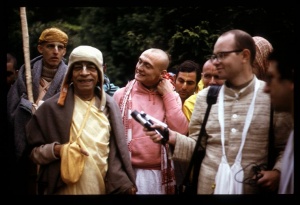SB 2.2.37

A.C. Bhaktivedanta Swami Prabhupada
TEXT 37
- pibanti ye bhagavata ātmanaḥ satāṁ
- kathāmṛtaṁ śravaṇa-puṭeṣu sambhṛtam
- punanti te viṣaya-vidūṣitāśayaṁ
- vrajanti tac-caraṇa-saroruhāntikam
SYNONYMS
pibanti — who drink; ye — those; bhagavataḥ — of the Personality of Godhead; ātmanaḥ — of the most dear; satām — of devotees; kathā-amṛtam — the nectar of the messages; śravaṇa-puṭeṣu — within the earholes; sambhṛtam — fully filled; punanti — purify; te — their; viṣaya — material enjoyment; vidūṣita-āśayam — polluted aim of life; vrajanti — do go back; tat — the Lord's; caraṇa — feet; saroruha-antikam — near the lotus.
TRANSLATION
Those who drink through aural reception, fully filled with the nectarean message of Lord Kṛṣṇa, the beloved of the devotees, purify the polluted aim of life known as material enjoyment and thus go back to Godhead, to the lotus feet of Him [the Personality of Godhead].
PURPORT
The sufferings of human society are due to a polluted aim of life, namely lording it over the material resources. The more human society engages in the exploitation of undeveloped material resources for sense gratification, the more it will be entrapped by the illusory, material energy of the Lord, and thus the distress of the world will be intensified instead of diminished. The human necessities of life are fully supplied by the Lord in the shape of food grains, milk, fruit, wood, stone, sugar, silk, jewels, cotton, salt, water, vegetables, etc., in sufficient quantity to feed and care for the human race of the world as well as the living beings on each and every planet within the universe. The supply source is complete, and only a little energy by the human being is required to get his necessities into the proper channel. There is no need of machines and tools or huge steel plants for artificially creating comforts of life. Life is never made comfortable by artificial needs, but by plain living and high thinking. The highest perfectional thinking for human society is suggested here by Śukadeva Gosvāmī, namely, sufficiently hearing Śrīmad-Bhāgavatam. For men in this age of Kali, when they have lost the perfect vision of life, this Śrīmad-Bhāgavatam is the torchlight by which to see the real path. Śrīla Jīva Gosvāmī Prabhupāda has commented on the kathāmṛtam mentioned in this verse and has indicated Śrīmad-Bhāgavatam to be the nectarean message of the Personality of Godhead. By sufficient hearing of Śrīmad-Bhāgavatam, the polluted aim of life, namely lording it over matter, will subside, and the people in general in all parts of the world will be able to live a peaceful life of knowledge and bliss.
For a pure devotee of the Lord, any topics in relation with His name, fame, quality, entourage, etc., are all pleasing, and because such topics have been approved by great devotees like Nārada, Hanumān, Nanda Mahārāja and other inhabitants of Vṛndāvana, certainly such messages are transcendental and pleasing to the heart and soul.
And by the constant hearing of the messages of the Bhagavad-gītā, and later of Śrīmad-Bhāgavatam, one is assured herein by Śrīla Śukadeva Gosvāmī that he will reach the Personality of Godhead and render Him transcendental loving service in the spiritual planet of the name Goloka Vṛndāvana, which resembles a huge lotus flower.
Thus by the process of bhakti-yoga, directly accepted, as suggested in this verse, by sufficient hearing of the transcendental message of the Lord, the material contamination is directly eliminated without one's attempting to contemplate the impersonal virāṭ conception of the Lord. And by practicing bhakti-yoga, if the performer is not purified from the material contamination, he must be a pseudodevotee. For such an imposter there is no remedy for being freed from material entanglement.
Thus end the Bhaktivedanta purports of the Second Canto, Second Chapter, of the Śrīmad-Bhāgavatam, entitled "The Lord in the Heart."